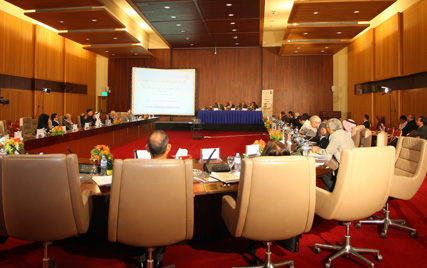 On October 19-20, 2010, the Arab Center for Research and Policy Studies held a symposium to discuss some of the major issues surrounding the relationship between the Arab world and Iran, primarily seeking to advance the possibility of establishing a unified position among the Arabs that will enable the them to maintain their differences while simultaneously reaching agreement with Iran. With Dr. Azmi Bishara, director of the center, offering the opening and closing remarks, scholars from all over the Arab world discussed various aspects of the relationship, giving background information about some of the fundamental and dynamic aspects (economic, political, religious) needed to understand the historical, and improve the current, relationship.
On October 19-20, 2010, the Arab Center for Research and Policy Studies held a symposium to discuss some of the major issues surrounding the relationship between the Arab world and Iran, primarily seeking to advance the possibility of establishing a unified position among the Arabs that will enable the them to maintain their differences while simultaneously reaching agreement with Iran. With Dr. Azmi Bishara, director of the center, offering the opening and closing remarks, scholars from all over the Arab world discussed various aspects of the relationship, giving background information about some of the fundamental and dynamic aspects (economic, political, religious) needed to understand the historical, and improve the current, relationship.
On December 19 and 20, 2010, The Arab Center for Research and Policy Studies convened the first of its symposiums on the topic "Iran and the Arabs: A Review of History and Politics."
Participants: Azmi Bishara, Fahmi Houeidi, Wajih Kawtharani, Muhammad al-Ahmari, Talal Atrissi, Anwar Taha, Sheikh Rashid al-Ghanushi, Muhammad al-Shinqayti, Nevine Masaad
_____________________
Azmi Bishara: We seek to advance the possibility of a unified position:
- to proceed from a clear, strategic vision.
- to encourage ideas and interpretations of enlightenment and reform.
- to dispel the notion that Iran constitutes a genuine threat to the Arab world.
On the 19th and 20th of December, 2010, the Arab Center for Research and Policy Studies convened the first of its symposiums in which the topic "Iran and the Arabs: a Review of History and Politics" was deliberated and discussed. Though it is true that the issue is contemporary and urgent, the symposium was held to treat the topic scientifically, from a historical and intellectual perspective.
The symposium that Dr. Mahjoob Zweiri organized, in which a number of prominent researchers and Arab intellectuals participated, dealt with a series of crucial panels on the role of history, geography, and religion in the relations between Iran and the Arabs, as well as the ramifications of these relations, the specifics that relate to the Arab East (Mashriq), the Arab Maghreb and the Palestinian question. In addition, the symposium dealt with Arab nationalist and international dimensions of relations with Iran. Researchers from multiple regions participated in the symposium, including Dr. Burhan Galyoun, Dr. Talal Atrissi, Dr. Wajih Kawtharani, Dr. Fatimah al-Samadi, Dr. Muhammad al-Sa'id Idris, Dr. Musa al-Gharir, Dr. Muhammad al-Ahmari, Dr. Anwar Abu-Taha, and Dr. Neveen Masaad.
Azmi Bishara: We seek to advance the possibility of establishing a unified position that will enable the Arabs to maintain their differences and reach agreement with Iran.
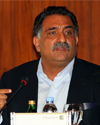 General Director of the center, Dr. Azmi Bishara, delivered the opening speech of the symposium, explaining the message, goals, and research activities of the center. He emphasized that the vitality of the center is represented in the attempt to form an Arab- intellectual public forum that will be a space for intellectual exchange, and the formulation of research agendas in order for researchers to guide public opinion and institutions. He also clarified that the center will be devoted, through dialogue and debate between researchers and Arab specialists, to relations with important and neighboring non-Arab states. "We seek to formulate a minimum threshold for conceptualizing the interests of this ummah (nation)."
General Director of the center, Dr. Azmi Bishara, delivered the opening speech of the symposium, explaining the message, goals, and research activities of the center. He emphasized that the vitality of the center is represented in the attempt to form an Arab- intellectual public forum that will be a space for intellectual exchange, and the formulation of research agendas in order for researchers to guide public opinion and institutions. He also clarified that the center will be devoted, through dialogue and debate between researchers and Arab specialists, to relations with important and neighboring non-Arab states. "We seek to formulate a minimum threshold for conceptualizing the interests of this ummah (nation)."
Dr. Bishara indicated that the center will publish and distribute its publications in Arabic and English, mentioning that the centre is planning to hold many conferences and symposiums in which Arab and non-Arab intellectuals and thinkers will participate. Nevertheless, the center wishes, in the beginning, to undertake discussions on the basis of finding a minimum common ground, which, in the context of its first symposium, constitutes advancing the possibility of establishing a unified position that will enable the Arabs to maintain their differences and reach agreement with Iran. This unified stance is expected to enable Arabs to cooperate with Iran, without forfeiting the precautions or conceding the red lines which Iran must observe that are termed matters of Arab national security. Second, [Dr. Bishara questioned] whether Iran constitutes an opponent of the Arabs, or a threat that will push them to reconsider questions of sovereignty, its relationship to growth, and the question of dependency on the West. This might shed a new light on the importance of the project of state.
In addition, Dr. Bishara presented what he described as "general observations" on the topic of the Arab-Iranian relations. In these, he expounded on the period following the American War on Iraq, when a strong barrier in the region to Iranian influence collapsed, and began to spread in Iraq. The neighboring Arab countries, to say nothing of the distant ones, did not have any plan of action, either joint or individual, for action in Iraq, to influence its future after the collapse of the previous regime under the effect of war and occupation. Moreover, Iran had opposed the war theoretically, but in practice had prepared itself and stood ready to benefit from the situation from the time before the war. It had prepared the necessary cadres for this, and set goals for itself, subsequently working diligently to implement them. Among these considerations were that the US would be sufficiently victorious in Iraq to dispose of the Ba'athist regime, but not to the extent that it would prove capable of striking Iran and that Iran would hasten to root its influence in Iraq, preventing the re-emergence of a strong Iraq. Thus, Iran took a theoretical position towards the war, but benefited from it in practice. Whenever the matter served its purpose, it would switch from disrupting the American domination of Iraq to its supporting - selectively of course - the resistance groups. Also, it hastened to recognize the Parliament of the Interim Government on November 17, 2003; that is, right from the outset of its formation.
In the course of his discussion of the positions of the Arab states, Dr. Bishara said that the position of some of them amounted to "supporting the war even if pretensions were the opposite", or "maintaining silence", while others "opposed the war". However, the Arab states did not support the resistance, except for Syrian facilitation of the passage of fighters across the border. Bishara added that the Arab states did not coordinate any steps to formulate an Arab policy in Iraq, and remained perplexed as to whom to support, which led to an increase in Iranian influence; he noted that although there was an interim government, the Arab states did not recognize it, and, if they did, they did so reluctantly. Also, they did not support the resistance (i.e., they lacked the strategic capacity). Dr. Bishara also asserted that it is simple to examine known Iranian encroachment on Arab interests in Iraq; however, the greater challenge is in perceiving the Arab situation itself. If this analysis is conducted scientifically, the study of Arab relations with any other large, regional state, or even with a superpower such as the United States, becomes a critical device to shed light on the major problems of the Arab situation itself.
Fahmi Huwaydi: To embark from a clear, strategic vision that encompasses the ultimate interests of the ummah.
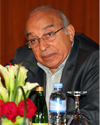 Professor Fahmi Huwaydi, Dr. Wajih Kawtharani, and Dr. Mahjoob Zweiri, participated in the opening session. Dr. Huwaydi indicated the effect of madhab (doctrinal school/sect) and politics on relations between the Arabs and Iran, despite their belonging to a single religion. He asserted that the relations between the two sides have passed through four stages, which are: the aftermath of the conquest of Persia and the embracing of Islam; the transformation of Iran to the Shi'ite madhab during the Safavid era; the era of Western influence on Iran, and its transformation to an arena of international conflict, and, subsequently, it's becoming a base for American influence; its clash with the nationalist tide that was led by Egypt during Nasser's period; and the exchange of roles in the shadow of the hegemony of Western influence in the Arab world, where Iran became independent after the Islamic Revolution.
Professor Fahmi Huwaydi, Dr. Wajih Kawtharani, and Dr. Mahjoob Zweiri, participated in the opening session. Dr. Huwaydi indicated the effect of madhab (doctrinal school/sect) and politics on relations between the Arabs and Iran, despite their belonging to a single religion. He asserted that the relations between the two sides have passed through four stages, which are: the aftermath of the conquest of Persia and the embracing of Islam; the transformation of Iran to the Shi'ite madhab during the Safavid era; the era of Western influence on Iran, and its transformation to an arena of international conflict, and, subsequently, it's becoming a base for American influence; its clash with the nationalist tide that was led by Egypt during Nasser's period; and the exchange of roles in the shadow of the hegemony of Western influence in the Arab world, where Iran became independent after the Islamic Revolution.
In terms of Arab-Iranian relations, Huwaydi emphasized the necessity of proceeding from a clear, strategic vision that encompasses the ultimate interests of the ummah. Not only should goals be delineated for this vision, but these aims should also be prioritized strategically in a way that does not ignore the elements of history and geography, but in a way that puts these elements to use in confronting the challenges of the present and the future. Huwaydi considers that, in terms of strategic thinking, the Middle East has three primary pillars that are represented by Egypt, Iran, and Turkey, and that an agreement (understanding) between these states will open the door for renaissance for the entire region. On the contrary, any discord or schism among them will constitute a significant impediment that will prevent them from progress and stability. Also it is not warranted that all discord between the Arabs and Iran be brought to an end in order for them to reconcile and cooperate. Rather, what is needed is to provide some measure of trust between the two sides that permits administering this disagreement in a civilized and modern way additionally, no one would be able to consider all the Shi'a of the Arab region on the basis of the Iranian quarter, as the reality of the situation is not necessarily like that. What is important is for the Arab regimes to deal with the Shi'a who live under their aegis as citizens who possess all the rights of citizenship in their countries.
Wajih Kawtharani: The ‘mythologization' of the battle of al-Qadisiyah in Ideological Memory as if it were a Battle between two Nationalisms (Qawmiyyatayn)
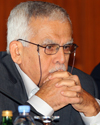 In his paper, Dr. Wajih Kawtharani presented select points in the history of the Arab-Iranian relations in order to shed light on the distinction between memory and history. He selected a set of cases to emphasize the difference between objective history and memory of mythology and legend: the battle of al-Qadisiyh; the case of al-shu'ubiyah (i.e., the populist chauvinist movements) and Iran and the Arabs; the conversion to Shi'ism (lit., ‘Shi'ization') and the inculcation and spread of Sunni Islam (lit., ‘Sunnization'); the war between the Safavids and the Ottomans; the wilayat al-faqih al-‘aamah (i.e., the ‘general trusteeship of the jurist') - its significance and model manifestations in Arab and Iranian spheres. Kawtharani explained that al-Qadisiyah, in mythological-ideological memory, is a battle between two nationalisms wherein the Arab collective memory, especially that which was formed through the effect of the impetus of its pull and threats, recollects images of victorious tribal group sentiment (al-‘asabiyyah) of instigation and catalysis when in reality al-Qadisiyah was, like the battle of Yarmuk and the conquest of Egypt, an expression of the manifestations of a phase of conflict between empires on the verge of disintegration.
In his paper, Dr. Wajih Kawtharani presented select points in the history of the Arab-Iranian relations in order to shed light on the distinction between memory and history. He selected a set of cases to emphasize the difference between objective history and memory of mythology and legend: the battle of al-Qadisiyh; the case of al-shu'ubiyah (i.e., the populist chauvinist movements) and Iran and the Arabs; the conversion to Shi'ism (lit., ‘Shi'ization') and the inculcation and spread of Sunni Islam (lit., ‘Sunnization'); the war between the Safavids and the Ottomans; the wilayat al-faqih al-‘aamah (i.e., the ‘general trusteeship of the jurist') - its significance and model manifestations in Arab and Iranian spheres. Kawtharani explained that al-Qadisiyah, in mythological-ideological memory, is a battle between two nationalisms wherein the Arab collective memory, especially that which was formed through the effect of the impetus of its pull and threats, recollects images of victorious tribal group sentiment (al-‘asabiyyah) of instigation and catalysis when in reality al-Qadisiyah was, like the battle of Yarmuk and the conquest of Egypt, an expression of the manifestations of a phase of conflict between empires on the verge of disintegration.
During the Arab-Iran panel, between the Shi'ization and Sunnization (al-tashayyu' wa al-tasunnan), Kawtharani rejected the conception that is repeated as a motif in Arab or Iranian memory of early Shi'ization in Iran having been concomitant with a Persian nationalist stance, or that the origin of Shi'ism was Persian, saying that these were images carried along by fantastic narratives of legend. As for the case of the Ottoman-Safavid conflict, in terms of madhab (doctrinal school), he refers to the emergence of two historical phenomena in this struggle: the first exemplified the increasing issuances and exchanges of fatwas of takfir (i.e., legal opinions making accusations of unbelief) between the rival fuqaha' (jurists) of the Ottoman and Safavid camps, and, the second, in the numerous Arab Shi'ite ulama' (scholars) who were recruited by Sah Isma'il to inculcate and disseminate Shi'ism and Iran, and in their vanguard was Sheikh Nur al-Din al-Karaki.
The paper presented by Dr. Mahjoob Zweiri, Coordinator of the Symposium, stressed the role of geography in the relations between Arabs and Iran, given that the Arabs were familiar with the lands of Persia (bilad al-furs) in the ancient past, just as the Persians were likewise acquainted with the lands of the Arabs. He cited in evidence of this the depictions on walls extant in Shiraz which show Arabs on their camels offering gifts to the Akhmenid emperor, an indication of Iranian influence in the lands of the Arabs, Iraq and the Arabian Peninsula.
Muhammad al-Ahmari: It is necessary to encourage the ideas and interpretations of enlightenment and reform in order to minimize sectarian danger.
 The second panel of the symposium, which included three working papers presented by Dr. Muhammad al-Ahmari, Dr. Mazen Isma'il and Dr. Musa al-Gharir, deliberated Arab-Iranian relations. Dr. al-Ahmari presented a working paper entitled "Myth and Reality in Iranian-Arab Relations" in which he discussed the lack of an independent political vision for Arab governments towards this issue. Similarly, he reviewed the internal and external factors influencing Arab-Iranian relations, in addition to the influence of oil, while considering the alarmism over the Iranian threat, and whether or not this alarm is genuine or illusionary, aimed directly at the investiture of Israel as politically and conceptually in charge in lieu of the deficient governments. He stressed the importance of encouraging ideas and interpretations of enlightenment and reform, as well as intellectual renewal in the two doctrinal schools - Shi'ite and Sunni - and that this is a means to guarantee the minimization of sectarian perils and conflicts.
The second panel of the symposium, which included three working papers presented by Dr. Muhammad al-Ahmari, Dr. Mazen Isma'il and Dr. Musa al-Gharir, deliberated Arab-Iranian relations. Dr. al-Ahmari presented a working paper entitled "Myth and Reality in Iranian-Arab Relations" in which he discussed the lack of an independent political vision for Arab governments towards this issue. Similarly, he reviewed the internal and external factors influencing Arab-Iranian relations, in addition to the influence of oil, while considering the alarmism over the Iranian threat, and whether or not this alarm is genuine or illusionary, aimed directly at the investiture of Israel as politically and conceptually in charge in lieu of the deficient governments. He stressed the importance of encouraging ideas and interpretations of enlightenment and reform, as well as intellectual renewal in the two doctrinal schools - Shi'ite and Sunni - and that this is a means to guarantee the minimization of sectarian perils and conflicts.
Dr. Ramadani, who was absent due to adverse weather conditions and the closure of Heathrow airport in London, submitted a paper discussing Iranian-Iraqi relations, and scenarios of these, in light of the scheduled American withdrawal at the end of 2011. Dr. Musa al-Gharir's paper covered Syrian-Iranian relations, including the principles upon which these persist, and the consideration that it might be possible to take the successes achieved in Syrian-Iranian relations as models which can potentially be built upon in order to inculcate trust and reassurance with neighboring Arab countries by encouraging openness and dialogue with the Iranian side, gradually dispelling fear and doubt propagated and sustained by America, Israel and Europe, in order to formulate a policy based on cooperation and coordination that is grounded in clear and well-defined criteria and a set of reassurances which respect the particularities and sovereignty of each state.
Talal Atrissi: The relations of Arab states with Iran are not uni-dimensional.
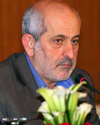 Dr. Talal Atrissi spoke on one of the most crucial aspects of the symposium, which is the relations of Iran to the states of the Arab East, and the Gulf states in particular, indicating that relations with Iran are not uni-dimensional, but vary according to disparate interests, as well as fear of Iran. He asserted that relations between Iran and the Arab states were neither good nor bad, and that the description of these relations varies from one stage to another.
Dr. Talal Atrissi spoke on one of the most crucial aspects of the symposium, which is the relations of Iran to the states of the Arab East, and the Gulf states in particular, indicating that relations with Iran are not uni-dimensional, but vary according to disparate interests, as well as fear of Iran. He asserted that relations between Iran and the Arab states were neither good nor bad, and that the description of these relations varies from one stage to another.
Atrissi argued that the strategic transformation, which transpired in Iran-Iraq relations, occurred after the fall of the regime of Saddam Hussein when relations entered a new phase, previously unknown in the history of the two countries. It suffices to recall that Iraq has signed more than 170 agreements with Iran, and the volume of trade exchanged in 2009 was approximately 7 billion dollars. Furthermore, Tehran predicted the value of exports to Iraq to reach approximately 8 billion dollars in 2010, and, through this exchange, Iran constitutes the primary trading partner of Iraq. Attrisi indicated the political influence of Iran in Iraq, a matter which led the US to seek dialogue with Iran over the future of Iraq.
In regard to relations between Iran and the Arab states of the Gulf, he pointed to the relations of Iran with Saudi Arabia at the political level, and its relations with the United Arab Emirates on an economic one, saying that the political differences between Iran and Saudi Arabia were due to some unresolved issues in the region. As for the UAE, Dubai, being the commercial capital, came into prominence by playing the most conspicuous role in relations with Iran.
Anwar Taha: Exposure of Arab regimes led to Iranian inroads into the Arab sphere.
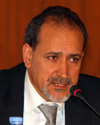 For his part, Dr. Anwar Taha dealt with the relations of Iran in the case of Palestine (the deliberation between ideologies and interests) where there are four major Iranian political currents: the nationalist-pragmatic trend; the national Islamist trend - calling for conceding (and recognizing) international borders; the trend of the line of the Imam, which is the official and prevailing orientation; and the salafist trend of the divine mandate which is unconcerned with reprisals or repercussions, and calls for abiding by the strictures of Islamic-legal culpability (al-taklif) dedicated to mobilization for the victory of Islam, which does not recognize borders. He argued that the exposure of Arab regimes affirms the theory of the regional vacuum, which has facilitated Iranian inroads into the Arab sphere from the Arab Gulf to the (Atlantic) Ocean, due to Iran's position vis-à-vis the historical case of the Arabs (Palestine), and to fragmented positions towards Israeli policies and Western plans in the region.
For his part, Dr. Anwar Taha dealt with the relations of Iran in the case of Palestine (the deliberation between ideologies and interests) where there are four major Iranian political currents: the nationalist-pragmatic trend; the national Islamist trend - calling for conceding (and recognizing) international borders; the trend of the line of the Imam, which is the official and prevailing orientation; and the salafist trend of the divine mandate which is unconcerned with reprisals or repercussions, and calls for abiding by the strictures of Islamic-legal culpability (al-taklif) dedicated to mobilization for the victory of Islam, which does not recognize borders. He argued that the exposure of Arab regimes affirms the theory of the regional vacuum, which has facilitated Iranian inroads into the Arab sphere from the Arab Gulf to the (Atlantic) Ocean, due to Iran's position vis-à-vis the historical case of the Arabs (Palestine), and to fragmented positions towards Israeli policies and Western plans in the region.
According to researcher Fatimah al-Samadi, the relation between Iran and the resistance movement is not new, but it took on new dimensions (in the Iran of Ahmadi Najad). Iran does not deny its ambitious role in the region, impossible to bypass or ignore, and they desire to be internationally recognized as a primary player in regional politics; at the same time, they are seeking to foil the American agenda throughout the region. She said that the relations between Iran and the Hamas movement are more recent and have been enhanced lately. This has been reflected in the financial and logistical support Iran has provided to Hamas, who are suffering from the Arab embargo. She added that, in Iran, there is no single orientation in what pertains to the resistance and the Palestinian case; rather, there are multiple orientations. One of these reflects the policy of Iran towards Palestine, and another which does not hide its hostility towards whatever relates to the Arabs; the proponents of this latter orientation contend that all that has afflicted Iran can be traced back to the victory of the Arabs over the Sassanians.
Rashid al-Ghanushi: Relations of Iran with the Arab States of the Maghreb, vacillating between ideals and interests.
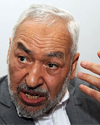 In the session which dealt with the Arab Maghreb and Iran, Sheikh Rashid al-Ghanushi presented a paper, entitled "Troubled Iranian-Maghrebi Relations," on the political and conceptual background that has governed the relations between Iran and the Arab Maghreb since the outbreak of the Iranian Revolution. He stated that the relations of Iran and the states of the Arab Maghreb have fluctuated based on ideas and interests, indicating that the Tunisian regime, in the 1980s, cut off its relations with Iran on the presumption that it was supporting the "Islamic Tendency Movement" (harakat al-ittijah al-islami). Relations did not resume until the 1990s, after the Tunisian regime was assured that the Islamic movement had been sufficiently weakened, and that it would no longer constitute an internal threat, leaving it up to Interpol to isolate the threat externally. This led to development in trade and cultural relations, and the appearance of Shi'ism in Tunisia, the development of relations, and the exchange of students to cities such as Qom. In terms of Algerian-Iranian relations, al-Ghanushi said that these were subject to turbulence for similar reasons to those in Tunis, despite the Algerian diplomatic role in thorny Iranian issues, such as the case of Shatt al-Arab in Iraq and the arrest of American diplomats in Iran. However, relations with Iran were cut off after the military coup in the wake of Algerian elections at the beginning of the 1990s, accusing Iran of backing the Islamic Salvation Front (FIS); relations remained severed until President Boutafleika came to power and made relations develop rapidly, after an exchange of visits at the highest levels between presidents and senior high-ranking officials. This was followed by the signing of an accord in 19 areas; despite this fact, cooperation did not lead to any further political ties; however, there were side-effects of the cooperation demonstrated though the Shi'ite mass preaching (or da'wa) in some neighborhoods of the capital, as well as in other cities, along with the Iranian government awarding educational grants to Algerian students. Additionally, the distribution of Shi'ite publications was successful to the extent that entire families became Shi'ite. al-Ghunushi believes is due to the weakness of the religious referential authority and cultural immunity in Algerian society.
In the session which dealt with the Arab Maghreb and Iran, Sheikh Rashid al-Ghanushi presented a paper, entitled "Troubled Iranian-Maghrebi Relations," on the political and conceptual background that has governed the relations between Iran and the Arab Maghreb since the outbreak of the Iranian Revolution. He stated that the relations of Iran and the states of the Arab Maghreb have fluctuated based on ideas and interests, indicating that the Tunisian regime, in the 1980s, cut off its relations with Iran on the presumption that it was supporting the "Islamic Tendency Movement" (harakat al-ittijah al-islami). Relations did not resume until the 1990s, after the Tunisian regime was assured that the Islamic movement had been sufficiently weakened, and that it would no longer constitute an internal threat, leaving it up to Interpol to isolate the threat externally. This led to development in trade and cultural relations, and the appearance of Shi'ism in Tunisia, the development of relations, and the exchange of students to cities such as Qom. In terms of Algerian-Iranian relations, al-Ghanushi said that these were subject to turbulence for similar reasons to those in Tunis, despite the Algerian diplomatic role in thorny Iranian issues, such as the case of Shatt al-Arab in Iraq and the arrest of American diplomats in Iran. However, relations with Iran were cut off after the military coup in the wake of Algerian elections at the beginning of the 1990s, accusing Iran of backing the Islamic Salvation Front (FIS); relations remained severed until President Boutafleika came to power and made relations develop rapidly, after an exchange of visits at the highest levels between presidents and senior high-ranking officials. This was followed by the signing of an accord in 19 areas; despite this fact, cooperation did not lead to any further political ties; however, there were side-effects of the cooperation demonstrated though the Shi'ite mass preaching (or da'wa) in some neighborhoods of the capital, as well as in other cities, along with the Iranian government awarding educational grants to Algerian students. Additionally, the distribution of Shi'ite publications was successful to the extent that entire families became Shi'ite. al-Ghunushi believes is due to the weakness of the religious referential authority and cultural immunity in Algerian society.
From his standpoint, researcher Hussein al-Zawi undertook examining the challenges of history and the geo-political fluctuations between Iran and the Arab states of the Maghreb. He asserted that relations between Iran and the states of the Magrheb differ entirely from its relations with the states of the East (i.e., the Arab Mashreq), where these latter states view Iran as an obstinate historical opponent, whose danger sometimes exceeds that of Israel itself. al-Zawi's paper dealt with a number of important themes, such as the Arab Maghreb and Iran, the geopolitical space of France, Algeria, and Iran (from mediation to struggle to alliance), the invariables of history and the transformations of the present, Moroccan-Iranian relations (between official and popular positions), Libya and Iran - convergence in policies and differences in strategies, Tunis and Iran, as well as stability and relations in search of guarantees.
The paper of Dr. Abd al-‘Ali Hami al-Din, entitled "Iran-Maghreb Relations from Rupture to Détente: factors of convergence and the prospect of the future," addressed another aspect of the relations between Iran and the states of the Arab Maghreb. He said there is a general Arab orientation of openness towards Iran, reciprocated in positive steps taken by Iran on the ground towards the Arab world. This was translated through security, economic, and cultural agreements between a large number of Arab states and Iran, indicating coordination of positions at the level of the nuclear dossier and African affairs, contributing to the delineation of a strategy to confront the challenges of globalization, as well as cooperation and reinforcing the concept of dialogue of civilizations. He moved to a crucial topic, affecting the rapprochement of different madhabs (doctrinal schools), and contributing to solving the problematic relationship between Sunnis and Shi'ites which has come to the fore in the wake of the American invasion of Iraq.
al-Tahir al-Adgham stated in his paper that there is discussion of an Iranian-Maghreb axis, where the lion's share of gains would be in favor of Iran, which is a matter not far removed from the standpoint of form. However, it is not cause for too much concern because the states of the Arab Maghreb also have interests and cards which they can play in this matter whether in regard to the balance in its relations with Europe and the United States or in the expansion of their trade and economic relations.
Session for Open Debate
On the second and last day of the symposium, the researchers held open discussions through an in-depth debate run by the center in its capacity as a center for policy studies with the goal of answering two questions: does Iran constitute a challenge or a threat to the Arab world? Is it possible to arrive at a unified Arab position with regard to Iran that encompasses, at least, a definition of Arab interests, despite great disparity in Arab positions? Opinions differed around these two questions, which were posited in order to permit Arab intellectuals to formulate a model for the possibility of embarking from the point of the common interests of the ummah (nation) with the goal of framing responses to the like of these questions, which confuse Arab politicians and cause them to quarrel.
Dr. Azmi Bishara, General Director of the center, opened the dialogue session with a question, asking: "How can an Arab ummah persist without delineating common interests and a minimum level of mutual security?" He presented, herewith, insights that clarified a number of the topic's aspects. Dr. Bishara indicated that: "The Arab Center for Research aims at changing political discourse through educated elites in the Arab world via frequently holding similar dialogues."
Muhammad al-Shanqiti: Iran is an illusionary threat to the Arab World.
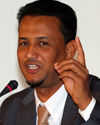 Dr. Muhammad al-Shanqiti was the first among speakers in the session, saying that Iran constitutes a challenge to the Arab world and at the same time an imaginary threat. He asserted that the threat of Iran many imagine comes from Arab reaction; he touched upon a sensitive issue, which is the case of the Shi'ites and the Sunnis. He said that despite the fact this is an ancient case, it has developed recently to assume a political dimension, indicating the example of the partisan conflict between the people of Baghdad in the neighborhoods of al-Karkh and Bab al-Basrah.
Dr. Muhammad al-Shanqiti was the first among speakers in the session, saying that Iran constitutes a challenge to the Arab world and at the same time an imaginary threat. He asserted that the threat of Iran many imagine comes from Arab reaction; he touched upon a sensitive issue, which is the case of the Shi'ites and the Sunnis. He said that despite the fact this is an ancient case, it has developed recently to assume a political dimension, indicating the example of the partisan conflict between the people of Baghdad in the neighborhoods of al-Karkh and Bab al-Basrah.
al-Shanqiti said that the Arab world suffers from the problem of defining the identity of the enemy. He mentioned that this is a symptom of a disease, which he termed "political legitimacy," among the regimes. In the course of discussing the Iranian nuclear program, he pointed out that it is in the interests of the Arabs, and not against them, making clear that Iran - if it were able to produce nuclear weapons - would enter into a ‘cold war,' which is preferable over being subject to a nuclear war from one side, Israel. He pointed, in this, to the psychological implications ensuing from possession of nuclear weapons by Iran, saying that according to a survey conducted by a Western newspaper, approximately 22% of Israelis would leave the region, based on their testimonials to the newspaper, if Iran were to possess nuclear weapons. He argued that the feigned weeping over Iranian interference in Arab affairs was devoid of meaning as Iran intervenes with the permission of the ruling authorities. He said that he could not envision a unified position which might be taken by the Arab states towards Iran.
Dr. Fatimah al-Samadi, expert on Iranian affairs, said that the nuclear dossier is the touchstone according to which Iran is assessed by all nations. In the arena of American-Iranian relations, she said that these were not as we envision them, given that President Najad, among all other Iranian officials, has engaged the most in dialogue. She indicated that Iran has conditions for its relations with the United States, the most prominent of which is recognition of the legitimacy of its role in the region.
Dr. Anwar ‘Abd al-Hadi said that reconstructing the Arab regime is a crucial matter in order to confront the challenge which Iran might constitute. He asserted that it is not possible to discuss any Arab national security in isolation from the Palestinian question, and added that Iran sees that attaining a certain state of national security is reached through the Palestinian issue, emphasizing that the position of European nations towards the Iranian nuclear file hinges on the position of Iran towards Israel.
Samir Hijjawi said in his interpolation that taking a unified position through the Arab regimes is an intractable issue as there are multiple opinions and intertwined linkages; at the same time, the Arab regimes espouse different agendas, and, therefore, fall into hostilities with Iran. He stressed that, at the level of the people, there is no hostility towards Iran. He said that the essential issue is for us Arabs to define what we want from Iran, and how to attain what we desire. Also, he made mention of the status of relations between Iran and the UAE, making clear that while problems exist between the two nations, the UAE is the nation which enjoys the most trade with Iran. He said that Iran represents a challenge and threat to the Arab world, but at the same time an opportunity, pointing to Iranian hands in Yemen, Saudi Arabia and the Hezbollah cell in Egypt. He called for Iran to desist from what he calls ‘fooling and playing around' in the Arab nations and to stay away from sectarian instigations.
Muhammad al-Ahmari said that the anticipated threats from the Iranian regime were caused by the lack of an Arab initiative. He said in this context that Egypt, for example, is not the same Egypt of thirty years ago, and that the absence of an initiative made America a regional player. He asked if it were possible for us to conceive how the situation might be if Iran were out of the region. What would be the position of the resistance (al-muqawamah) in such situation? On the question of whether or not it is possible to reach a unified Arab position, he said that there are issues which must be resolved, such as the Palestinian issue, and then we will be able to discuss a unified Arab position. He said there is a golden opportunity now to formulate a unified Arab position in regard to Iraq as it is possible to evince an Arab position against a war directed at Iran.
From his perspective, Fahami al-Huwaidi said that Iran constitutes a challenge, even to the US, which says that there is no animosity between itself and Iran, but that it differs with it. al-Huwaidi took the position that Iran is a genuine challenge, but an imaginary threat; he did not, however, show optimism for reconstructing the Arab regime which was called for by some of the participants in the symposium.
However, Dr. ‘Abd al-‘Ali Hami al-Din says that if the Arabs are to have a say, they must possess sources of military, economic, and institutional power; if these elements are not to be found, they must be supplanted by other sources such as democracy, as is the case in Turkey and India.
Nevine Masaad: Arab Relations with Iran should be utilized to pressure the United States.
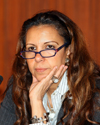 From her standpoint, researcher Ibtisam al-Katbi, sees that there is no Arab initiative towards Iran, nor towards any other power. She called for defining the position of our Arab countries towards Iran and delimiting what we desire from it.
From her standpoint, researcher Ibtisam al-Katbi, sees that there is no Arab initiative towards Iran, nor towards any other power. She called for defining the position of our Arab countries towards Iran and delimiting what we desire from it.
Dr. Nevine Masaad sees that Iran constitutes a threat to the states of the region, and enumerated a number of threats; however, she called for utilizing Arab relations with Iran as a means to pressure the United States. She did not see the likelihood of a unified Arab position at the level of the ruling elites. At the same time, people are divided.
However, Sheikh Rashid al-Ghanushi sees that the danger and threat is from Israel and not from Iran, when the latter is - according to geography - an original, authentic part of the region just as Iran is an Islamic state, a member of the Organization of the Islamic Council, and a partner in the defense of the security of the region, especially after it transitioned from the role of policeman to advocate of the Arabs. However, al-Ghanushi said that we want Iran to desist from fomenting strife, as represented in sectarian instigation of madhab, as such is incentive to strife (fitnah). He stressed the security of the Arabs except through alliances in the region and asked what the harm would be to us if Iran were to possess nuclear weapons. He added that Iran is taken to account for intimidating those who are afraid, indicating that Iran sent its message while the Arab states lack a message.
The aim of the open discussion was to formulate, according to the perception of the Arab intellectuals, what ought to be. Herein begins the function of the center, not only as a center for research, but also as a center for policy studies. All the participants concurred and reached consensus on the possibility of agreement between Arab intellectuals and analysts as to what ought to be. Thus, those gathered agreed on the necessity of publishing the symposium's proceedings which will include, at minimum, a collective perception with minimum consensus to be disseminated for public opinion.